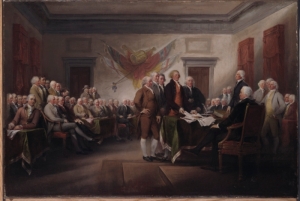 In this month’s episode, Ken Owen, Michael Hattem, and Roy Rogers pick apart the notion of “founders,” including the individualism that forms the foundation of our cultural memory of the Revolution, the idea of “second-tier” or “forgotten” founders and how those tiers are constructed, and the recent redefinition of what constitutes a “founder” and its impact on how we understand the American Revolution.
In this month’s episode, Ken Owen, Michael Hattem, and Roy Rogers pick apart the notion of “founders,” including the individualism that forms the foundation of our cultural memory of the Revolution, the idea of “second-tier” or “forgotten” founders and how those tiers are constructed, and the recent redefinition of what constitutes a “founder” and its impact on how we understand the American Revolution.
TOPIC
A large part of the American cultural inheritance is our collective memory of the American Revolution. This memory began to be shaped almost as soon as the Revolution ended. And though it has changed over time, individualism is one of the fundamental constants. From that emerged and developed the prominence of the “founding fathers” not only in our collective memory of the Revolution but in American culture, in general. Over the last twenty years, there has been a sustained interest in the founders by the reading public. But one can only read so many biographies of George Washington, John Adams, Thomas Jefferson, and Benjamin Franklin. This has led to the emergence of a spate of biographies of “second-tier” or “forgotten” founders. And, while it has broadened the popular notion of who might be called a founder, it is still very much within the individualist tradition. At the same time, work by academic historians over the last few decades has uncovered the lives and contributions of individuals and groups previously left out of our cultural memory of the Revolution.
QUESTIONS
- What is a “founder?”
- What earns someone the title of “founder?”
- How does the idea of “founders” shape our collective memory of the Revolution?
- What is a “second-tier” founder?
- What qualifies someone to be a “first-tier” founder? What disqualifies them?
- Can only politicians be considered “founders?”
SUBSCRIBE
As always, you can subscribe to “The JuntoCast” in iTunes or via RSS. The JuntoCast is also available on Spreaker, and recent episodes are also available at SoundCloud and YouTube.
FURTHER READING
Adair, Douglass. Fame and the Founding Fathers: Essays by Douglass Adair. Edited by H. Trevor Colbourn. New York: W. W. Norton & Co., 1974.
America’s Forgotten Founders. Edited by Gary L. Gregg and Mark David Hall. Wilmington: ISI Books, 2012.
Bernstein, R B. The Founding Fathers Reconsidered. New York: Oxford University Press, 2009.
Beyond the Founders: New Approaches to the Political History of the Early American Republic. Edited by Jeffrey L. Pasley, David Waldstreicher, and Andrew W. Robertson. David Waldstreicher. Chapel Hill: University of North Carolina Press, 2004.
Burnard, Trevor. “Review: The Founding Fathers in Early American Historiography: A View From Abroad.” The William and Mary Quarterly, Third Series 62, no. 4 (2005): 745–764.
Kammen, Michael G. A Season of Youth: The American Revolution & the Historical Imaginative. Ithaca: Cornell University Press, 1988.
McConville, Brendan. “Sage of the Small Screen: HBO’s John Adams.” Historically Speaking 10, no. 1 (2009): 9–10.
Revolutionary Founders: Rebels, Radicals, and Reformers in the Making of the Nation. Edited by Alfred F. Young, Ray Raphael, and Gary B. Nash. New York: Knopf, 2011.
Schocket, Andrew M. Fighting Over the Founders: How We Remember the American Revolution. New York: NYU Press, 2015.
–––. “Little Founders on the Small Screen: Interpreting a Multicultural American Revolution for Children’s Television.” Journal of American Studies 45, no. 1 (2010): 145–163.
Sedgwick, Theodore, Jr. A Memoir of the Life of William Livingston. New York: Printed and Published by J. & J. Harper, 1833.
Waldstreicher, David. “Founders Chic as Culture War.” Radical History Review 84 (2002): 185–194.
Wilentz, Sean. “America Made Easy: McCullough, Adams, and the Decline of Popular History.” The New Republic, July 2, 2001.
Young, Alfred F. The Shoemaker and the Tea Party: Memory and the American Revolution. Boston: Beacon Press, 1999.